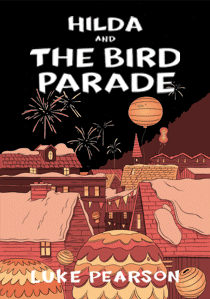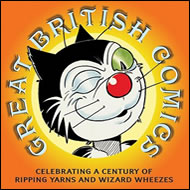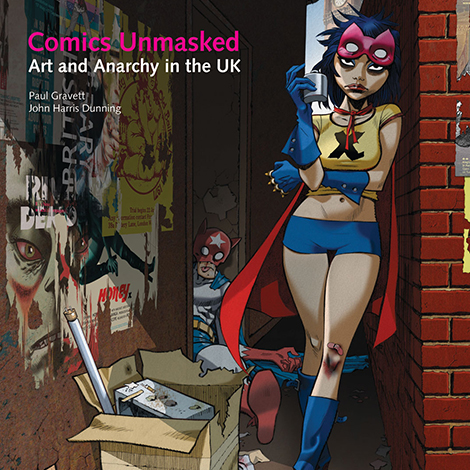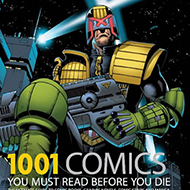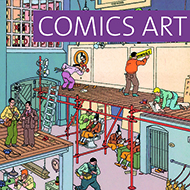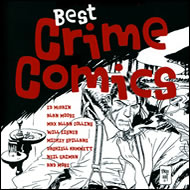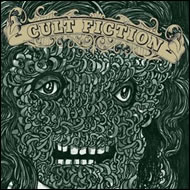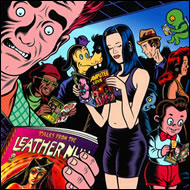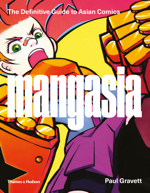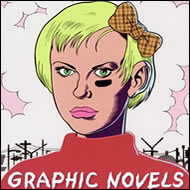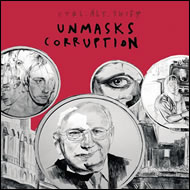Dr. Chris Murray:
Comics Studies In The UK
Dundee University in Scotland now offers a one year post-graduate course - MLitt In Comics Studies - allowing students to examine comics and graphic novels. Run by Dr Chris Murray, it is the only course of its kind in the UK… so I decided to find out more.

Paul Gravett:
What has made you so passionately interested in comics? What have been your epiphanies that convinced you to pursue a serious approach to this medium?
Dr. Chris Murray:
I’ve always been fascinated by comics. Some of my earliest memories are of comics being brought to me by my uncle. When I developed a love for literature, film and art it was clear to me that comics were very much a part of that family, and not the bairn of the bunch. Getting the opportunity to research comics for an undergraduate dissertation was an important step, and one that confirmed, if any confirmation was needed, that comics responded well to academic inquiry. Roger Sabin’s Adult Comics: An Introduction and Tom Inge’s Comics As Culture were huge influences. In terms of comics that were a big influence, it would have to be 2000AD, Warrior, all the early Grant Morrison I was reading before I knew who he was (Starblazer and Zoids), V For Vendetta, Watchmen, Zenith, Hellblazer, Maus, Barefoot Gen, Akira, Violent Cases and Signal To Noise. And I’d be remiss not to mention black and white (or two-tone) reprints UK reprints of Marvel comics (Lee, Kirby, Ditko, Romita), and Claremont’s X-Men, especially when John Byrne was providing the art.
As far as I know, the first college-accredited course on comics, at least in English, seems to be The Comic Book In Society at Indiana University, started in Spring 1972 by Michael Uslan (who went on to produce all of the modern Batman movies). He documents his success at initiating and promoting this in his autobiographical book The Boy Who Loved Batman. Are you aware of any other comics course like this being offered before in the UK?
Yes, there are a few modules on comics in various courses up and down the county, but not many. What makes this course different is that it is a full one year course, with several dedicated comics modules, leading to a named degree - MLitt in Comics Studies. Also, whereas other modules offer training in either art or writing we offer the opportunity to work on writing and art for comics, but surround that with a Humanities approach, requiring a historical and analytical engagement with the material. The result is that over the course of the year of study students are offered practical and vocational training alongside a rigorous critical approach.
What hurdles did you face convincing the University of Dundee to introduce this MLitt in Comics Studies?
No more hurdles than faced by any new programme. All new programmes of study have to go through an exacting approval process. However, I’ve been teaching comics at the University for a while,and have been teaching English Literature and Film for a good deal longer than that. I have also produced research in this area, and had been running conferences on comics, accompanied by exhibitions. In all these activities the University has been extremely supportive. The MLitt felt like a natural development, and if anything I had overwhelming support, for which I’m extremely grateful.

What made you orientate away from superheroes and fantasy and focus on the documentary and autobiographical?
I deal with superheroes and fantasy in my undergraduate module on Moore, Morrison and Gaiman. There’s a lot of genre in that module. I was struck by the amount of currently emerging criticism and research that looked and autobiographical and documentary comics. It seemed like a logical move to make that the first module on the MLitt. The second module looks at international comics cultures, so there will be some superheroes and fantasy in there, but very much in the mix with a lot of very interesting other genres. I’m certainly not suggesting by my choice to structure it in this way that there;s anything wrong with superheroes and fantasy, or any other genre. It is all worthy of study, but I have to seek balance and avoid repetition in the course content.
The announcement of this MLitt sparked some predictable reactions of so-called ‘dumbing down’. How do you best respond to these criticisms and prejudices?
By trying to run a good course and attending to the needs of my students. I don’t need to convince the world that my course is justified. Film Studies won the argument a couple of decades ago by producing some outstanding research and through well-constructed courses that allowed film scholars to teach their subject with determination and passion. When someone starts banging on about a “waste of public money” they either don’t understand how Universities are funded, especially when it comes to MLitts, or they know well enough but pretend not to in order to get the Daily Mail readers on their side. When someone talks about “dumbing down” Higher Education it is clear that they don’t know a thing about the intrinsic value of knowledge. All human culture is worthy of study. How one studies something, the questions you ask about it, are as important as what you are studying. I defer to Lex Luthor, played by Gene Hackman in Richard Donner’s Superman (1978),who says “some people can read War & Peace and come away thinking it’s a simple adventure story. Others can read the ingredients on a chewing gum wrapper and unlock the secrets of the universe”.
Michael Uslan, ‘The World’s First College Professor of Comic Books!’, cleverly stoked the local press about his new comics course in 1972 by anonymously ringing a reporter at a local news syndicate and hysterically complaining about taxpayers’ money being spent to teach kids comic books and it being a ‘communist plot to subvert the youth of America!’ This was 1972, of course. He hung up the phone and three days later, the reporter tracked Uslan down and the story ran in the paper. From there it was picked up all across the US, with even Playboy and TV coverage. Maybe this approach could work all over again? Discuss!
I wish I was that clever. I take my tips from the back of chewing gum wrappers.
What have been your personal experiences of attitudes towards Comics Studies in the educational world and within the media?
I’ve already spoken a little about my experiences in the educational world. In the media it is rather different. There’s always an angle. Comics are often presented as the odd curio, win a “gee whizz” comics have grown up kind of way. That has less to do with the reporters one speaks to, who are usually pretty interested and want to do the story justice, and more to do with editorial decisions,often forcing reporters to simplify the story in order to sell it, if they are freelancers, or to respond to an editor or sub-editor’s desire to jazz up a page with some Biff! Bam! graphics and a picture of Adam West or Lynda Carter. I understand this, as I have some close friends who work in that world, so I know the rules of the game. It is a bit tiresome though. What really bugs me are the factual errors that creep in, and when a sub-editor either edits a quote, changing the sense, or just puts convenient words in your mouth, attributing ideas or values that are simply incorrect! The problem comes when people unquestionably believe what they read in newspapers. Still, life’s too short to get wound up about it. On balance, having access to the media, and the fact that I’ve been given space in newspapers, on the radio and on TV, has been of benefit to me and the various events and courses I’ve organised, so I’m grateful for their interest and the opportunities. Just lay off the Biff Bam please!
Are there any set textbooks for the MLitt, either about comics or graphic novels themselves?
Yes, they include:
A Comics Studies Reader
edited by Jeet Heer & Kent Worcester
University of Mississippi Press, 2008
Documentary Graphic Novels & Social Realism
by Jeff Adams
Verlag Peter Lang, 2008
Graphic Subjects: Critical Essays On Autobiography & Graphic Novels
by Michael Chaney
University of Wisconsin Press, 2011
This Book Contains Graphic Language: Comics As Literature
by Rocco Versaci
Continuum, 2007
Alternative Comics: An Emerging Literature
by Charles Hatfield
University of Mississippi Press, 2005
The Rise Of The American Comics Artist: Creators & Contexts
by Paul Williams & James Lyons
University of Mississipi Press, 2010
Comics As History
by Joseph Witek
University of Mississippi Press, 1988
The System Of Comics
by Thierry Groensteen
University of Mississippi Press, 2009
Understanding Comics
by Scott McCloud
Harper Collins,1993

How will you involve local comics-related businesses, like D.C. Thomsons, or events like Dundee Comics Day or D-Con manga festival?
Certainly. DC Thomson have always supported my comics based activities in various ways, and they continue to do so. I am investigating possibilities of making closer ties with them. D-Con is great. I’m not involved in organising it, but am very supportive of it.
Do you envisage organising a new Dundee academic conference on comics perhaps in 2012 to relate to the course?
The Comics Day is enshrined in the Dundee calender, as are several more academically focussed talks on comics. I have plans for 2012, which I’m not able to discuss yet, and I am co-organising an academic conference on comics in Bournemouth in 2012, following on from the one in Manchester this year. This may come to Dundee in due course.
How is this MLitt geared to enhancing employment prospects? What strategies are in place to assist students in making comics their career path?
We are setting up internships, and the course is built around invited speaker talks from industry professionals, which makes the programme inherently vocational and therefore enhances employment prospects. This was very much part of the philosophy and behind the design of the course from the start.
Are you in touch with other university courses in comics elsewhere in the UK or abroad? What links do you hope to build for the future?
I’m building many more contacts in this regard, building on the ones I had already. I very much hope to develop these contacts and made Dundee a hub of comics teaching and research, and one that has close ties with other such hubs. I am putting in place the resources that will make this possible.
With Home/EU fees of £3,400 and overseas fees of £10,000, what are the options for financial help and scholarships?
There is AHRC funding,Carnegie funding for students domiciled in Scotland, and various University scholarships that act as partial fee waivers. Some of these are dedicated to the comics MLitt. I am discussing the possibility of setting up externally funded scholarships.
We have had Film Studies in the UK since the early Sixties, I believe. Why has it taken so long for Comics Studies to find its place in the academic and educational establishments? Why do you think that now this is finally beginning to change?
Where to start? It’s taken a while because only now do we have a critical mass of scholars and researchers working in this area. Film Studies programmes were set up as they were, or a time at least, good ways to bid for hardware (projectors, screening facilities, etc), and if the courses were practical film-making courses then all the equipment that goes with that. Setting up programmes like that allowed departments to bid for central university funds to set up these courses. With money and investment comes respectability and clout. And the mass appeal of film has continued to grow, whereas the popularity of comics has fluctuated wildly. Taken together these two factors established the circumstances whereby Film Studies grew quite quickly and comics studies has crawled behind. Still, with no discipline based dogma methodologies and approaches to comics have multiplied and diversified, which isn’t a bad thing. The time feels right for things to change, with comics studies having a certain momentum. Hopefully it will become more established without falling into dogma.
Where do you envisage the MLitt going in five or ten years’ time? What hopes to have for its future?
Big plans! Research centres, an archive or artwork and scripts, establishing the conditions for a network of UK based comics research hubs that have close ties to their equivalents in Europe and beyond. I want to put Dundee at the heart of this.
Posted: October 23, 2011
